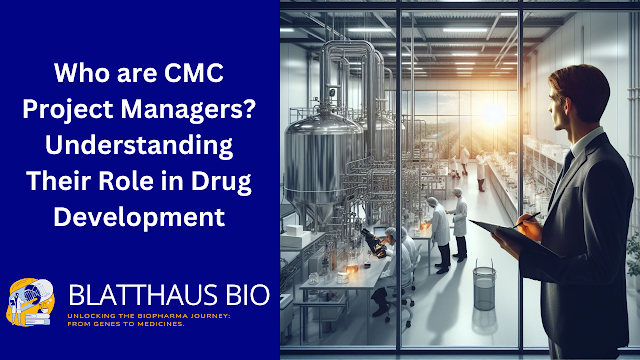Who are CMC Project Managers? Understanding Their Role in Drug Development
CMC stands for Chemistry, Manufacturing, and Controls. It's a critical field in drug development process that ensures the safety, purity, efficacy, and consistency of a drug throughout the development process.
Here's a breakdown of what each area focuses on:
- Chemistry focuses on the characterization of the drug substance, which is the active ingredient of the medication. This includes understanding the drug's structure, properties, and stability.
- Manufacturing focuses on the development of the process for producing the drug product, which is the final form of the medication that is delivered to patients. This includes designing and optimizing the manufacturing process to ensure that it is consistent and can produce high-quality drug product.
- Controls focuses on developing and implementing quality control procedures to ensure that the drug product meets all the predetermined specifications. This includes testing the drug product for purity, potency, and stability throughout the manufacturing process and shelf life
Program management is the art of overseeing a collection of interconnected projects working towards a shared organizational goal. It's distinct from regular project management in that it deals with the big picture, ensuring all the moving parts (individual projects) come together to achieve a larger strategic objective.
Here's a breakdown of program management:
- Focus on Strategy: Program managers keep the big picture in mind, aligning individual projects with the program's overall goals and ensuring they contribute to the organization's strategic objectives.
- Overseeing Multiple Projects: Programs typically consist of several interdependent projects. Program managers coordinate these projects, ensuring they don't conflict and resources are used efficiently.
- Benefits-Oriented: The success of a program is measured by the benefits it delivers to the organization, not just by the completion of individual projects.
Project management is the process of guiding a project team to achieve specific goals within a defined timeframe and budget. It's essentially the art of organizing and executing tasks to deliver a project successfully.
Here's a breakdown of the key aspects of project management:
- Planning and Defining Goals: This involves clearly outlining the project's objectives, deliverables, timeline, and budget. It also includes identifying potential risks and mitigation strategies.
- Teamwork and Resource Management: Project managers assemble and lead teams with the necessary skills to complete the project tasks. They also manage resources effectively, ensuring everyone has the tools and materials they need.
- Communication and Progress Tracking: Keeping everyone informed and on the same page is crucial. Project managers communicate effectively with stakeholders, team members, and clients throughout the project lifecycle. They also track progress to identify any deviations from the plan and make adjustments as needed.
A CMC Project Manager is essentially a leader who oversees the entire lifecycle of bringing a drug to market, focusing on the CMC aspects. They are the glue that holds everything together, ensuring various departments work seamlessly to deliver a safe and effective medication.
Here's a breakdown of their responsibilities:
- Planning and Strategy: They collaborate with scientists and engineers to develop a plan for manufacturing the drug, considering factors like cost, scalability, and regulatory requirements.
- Project Management: They manage the project timeline, budget, and resources, ensuring everything stays on track.
- Communication and Collaboration: They act as a bridge between cross functional teams involved in CMC, including process development, manufacturing, regulatory affairs (CMC) and quality. They facilitate communication and ensure everyone is working towards the same goal.
- Risk Management: They proactively identify and mitigate potential risks that could delay or derail the project.
- Regulatory Compliance: They ensure that all CMC activities comply with relevant regulations set by health agencies.
Now you've met CMC Project Managers, the unseen leaders who support the drug development team. They don't wave a fancy baton in the spotlight, but work tirelessly behind the scenes to support, connect, and keep everyone on track to deliver life-changing medications to patients. It's a complex job, but incredibly rewarding. When a new drug helps people, CMC Project Managers know they played a key part that makes a real difference in the world.
Disclaimer: The views expressed in this article are solely my own and do not reflect the opinions or positions of my current or any previous employer. This article was brought to life with the help of AI image generation and grammar checks.



Comments
Post a Comment